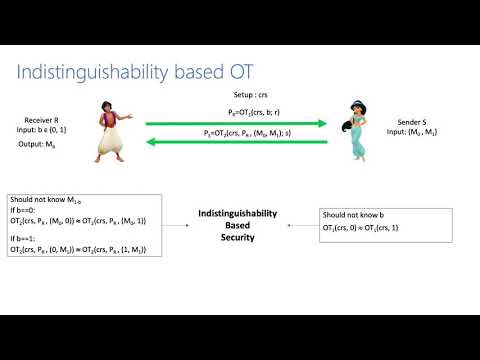CryptoDB
Two-Round Adaptively Secure MPC from Isogenies, LPN, or CDH
| Authors: |
|
|---|---|
| Download: | |
| Conference: | ASIACRYPT 2021 |
| Abstract: | We present a new framework for building round-optimal (two-round) adaptively secure MPC. We show that a relatively weak notion of OT that we call indistinguishability OT with receiver oblivious sampleability (r-iOT) is enough to build two-round, adaptively secure MPC against malicious adversaries in the CRS model. We then show how to construct r-iOT from CDH, LPN, or isogeny-based assumptions that can be viewed as group actions (such as CSIDH and CSI-FiSh). This yields the first concrete constructions of two-round adaptively secure MPC against malicious adversaries from CDH, LPN, or isogeny-based assumptions. We further extend our non-isogeny results to the plain model, achieving (to the best of our knowledge) the first construction of two-round adaptively secure MPC against semi-honest adversaries in the plain model from LPN. Our results allow us to build two-round adaptively secure MPC against malicious adversaries from essentially all of the well-studied assumptions in cryptography. In addition, our constructions from isogenies or LPN provide the first post-quantum alternatives to LWE-based constructions for round-optimal adaptively secure MPC. Along the way, we show that r-iOT also implies non-committing encryption (NCE), thereby yielding the first constructions of NCE from isogenies or LPN. |
Video from ASIACRYPT 2021
BibTeX
@inproceedings{asiacrypt-2021-31431,
title={Two-Round Adaptively Secure MPC from Isogenies, LPN, or CDH},
publisher={Springer-Verlag},
doi={10.1007/978-3-030-92075-3_11},
author={Navid Alamati and Hart Montgomery and Sikhar Patranabis and Pratik Sarkar},
year=2021
}

